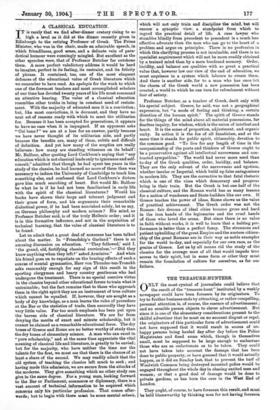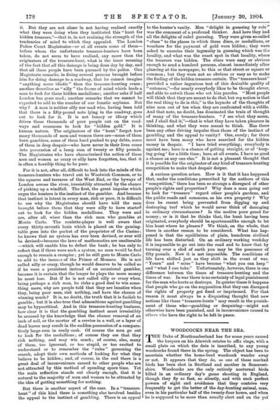O NLY the most cynical of journalists could believe that the
result of the "treasure-hunt" instituted by a weekly newspaper could have been foreseen by its originators. To try to further business ends by attracting, or rather compelling, personal attention is, of course, the essence of advertisement ; and no sensible person objects to clever advertisement. But since it is one of the elementary considerations present to the skilful advertiser that he must on no account disgust or repel, the originators of this particular form of advertisement could not have supposed that it would result in scores of un- happy persons being hauled day after day before the Police Magistrates and fined sums which, though in themselves small, must be supposed to be large enough to embarrass those who are so unfortunate as to be taken. They could not have taken into account the damage that has been done to public property, or have guessed that it would actually happen, as it did on Sunday last, that to prevent the turf of Woolwich Common being destroyed mounted police would be engaged throughout the whole day in chasing excited men and women; or that a good deal of damage would be done to private gardens, as has been the case in the West End of London.
They ought, of course, to have foreseen this result, and must be held blameworthy by thinking men for not having foreseen
it. But they are not alone in not having realised exactly .what they were doing when they instituted this "hunt for hidden treasure,"—that is, in not realising the strength of the tendencies of mind to which they appealed. The London Police Court Magistrates—or at all events some of them— before whom the unfortunate treasure-hunters have been taken, do not seem to have realised, any more than the originators of the treasure-hunt, what is the inner meaning of the fact that all this damage is being done day by day, and that all these people have been pursued by the police. One Magistrate remarks, in fining several persons brought before him for doing damage to a roadway, that he cannot imagine "anything more idiotic" than the treasure-hunting craze ; another describes as " silly " the frame of mind which leads a man to look for these hidden medallions; another asks if half London has gone mad ; another remarks that we cannot be expected to add to the number of our lunatic asylums. But why ? A man is neither silly nor mad who, having been told that there is a fifty-pound note lying in the roadway, goes out to look for it. It is not lunacy or idiocy which drives these thousands of poor people out on the road- ways and commons to look for "hidden gold." It is human nature. The originators of the " hunt " forgot how many thousands of men and women there are—some of them born gamblers, some of them hard pushed to pay debts, some of them in deep despair—who have never in their lives come into possession of a lump sum of twenty or fifty pounds. The Magistrates who have characterised the action:of these men and women as crazy or silly have forgotten, too, that it • is often a horrible thing to be poor.
For it is no after all, difficult to look into the minds of the treasure-hunters who travel out to Woolwich Common, or to the squares and terraces of the West End, or the byways of London across the river, irresistibly attracted by the chance of picking up a windfall. The first, the great impulse which urges the hunters is the instinct of the gambler. And because that instinct is latent in every man, rich or poor, it is difficult to see why 'the Magistrates should have told the men brought before them that they were silly to have started out to look for the hidden medallions. They were and are, after all, wiser than the rich man who gambles at Monte Carlo. The roulette-player is well aware that every thirty-seventh Ionia which is placed on the gaming- table goes into the pocket of the proprietor of the Casino ; he knows that no system has ever been devised, or ever will be devised—because the laws of mathematics are unalterable —which will enable him to defeat the bank ; he has only to reflect that if there were such a system, no man would be fool enough to remain a croupier ; yet he still goes to Monte Carlo to add to the income of the Prince of Monaco. He is not called silly or crazy, though he would deserve to be called so if he were a persistent instead of an occasional gambler, because it is certain that the longer he plays the more money be must lose. But if he is not called silly or crazy when, being perhaps a rich man, he risks a good deal to win some- thing more, why are people told that they are lunatics when they, being poor men, risk nothing, and have the chance of winning much? It is, no doubt, the truth that it is foolish to gamble.; but it is also true that admonitions against gambling may be hypocritical. And in this treasure-hunting business, how clear it is that the gambling instinct must irresistibly be aroused by the knowledge that the chance removal of an inch of soil, or the mortar of a crevice in a wall, or a layer of dead leaves may result in the sudden possession of a compara- tively large sum in ready cash. Of course the men go out to look for the medallions ; of course they see that they risk nothing, and may win much; of course, also, many of them, too ignorant, or too stupid, or too excited to understand or to remember the " rules " governing the search, adopt their own methods of looking for what they believe to be hidden ; and, of course, in the end there is a great deal of inconvenience caused to other people who are not attracted by this method of spending spare time. Yet the main reflection stands out clearly enough, that it is natural to the majority of men and women to be attracted by the idea of getting something for nothing.
But there is another aspect of the case. In a " treasure- hunt " of this kind there is something else involved besides the appeal to the instinct of gambling. There is an appeal
to the hunter's vanity.. Me m "delight in guessing by rule " was the comment of a profound thinker. And here they had all the delights of ruled guessing. They were given so-called " clues " to the places in which these discs, er medallions, or vouchers for the payment of gold were hidden; they were asked to exercise their ingenuity in guessing which WRS the locality, and what was the exact spot in that locality, where the treasure was hidden. The clues were easy or obvious enough to send a hundred persona, almost immediately after glancing at the newspaper, to this or that street or square or common ; but they were not so obvious or easy as to make the finding of the hidden treasure certain. The "treasure hunt" provided a rather ingenious test of this desirable quality of "cuteness,"—for nearly everybody likes to be thought clever, and able to outwit those who set him puzzles. "Most people will think that they are meant to do that, but my notion is that the real thing to do is this," is the keynote of the thoughts of nine men out of ten when they are confronted with a riddle. And that note, no doubt, has dominated the train of thought of many of the treasure-hunters. "I see what they mean, and I shall find it,"—that is what they have taken pleasure in thinking, and what they were meant to think. Has there been any other driving impulse than those of the instinct of gambling and the appeal to vanity? One, surely; for there must have been many who have searched for the hidden money in despair. "I have tried everything; everybody is against me; here is a chance of getting straight, or of keep- ing going' for a little time;, here, at all events, I have as good a chance as any one else." It is not a pleasant thought that it is possible for the originator of any kind of treasure-hunting competition to make that despair deeper.
A curious question arises. How is it that it has happened that, under the conditions prescribed by the authors of this "competition," there has been so strange a disregard of other people's rights and properties? Why does a man going out to look for "treasure" regard other people's gardens, and the public roads and commons, as his own property Why does he resent being prevented from digging up and destroying turf which he would never think of damaging in ordinary- circumstances ? Is the motive- pure greed for money; or is it that he thinks that, the hunt having been originated, everybody should be sportsmanlike enough to let him hunt where he pleases ? We think, on the whole, that there is another reason to be considered. What has hap- pened is that the equilibrium of plain, humdrum civilised life has been disturbed. On an ordinary working weekday it is impossible to go out into the road and to know that by turning over a clod of earth you may be the possessor of fifty pounds. Now it is not impossible. The conditions of life have shifted just as they shift in the event of war. " Yours " and " mine " have become "what you can keep" and "what I can take." Unfortunately, however, there is one difference between the times of treasure-hunting and the times of war. In war there is no certainty of legal punishment for the man who hurts or destroys. In quieter times it happens that people who go on the supposition that they can disregard the rights of property get fined or imprisoned. For that reason it must always be a disquieting thought that new notions like these " treasure-hunts " may result in the punish- ment of those who—gambling or despairing—might not otherwise have been punished, and in inconvenience caused to others who have the right to be left in peace.























































 Previous page
Previous page